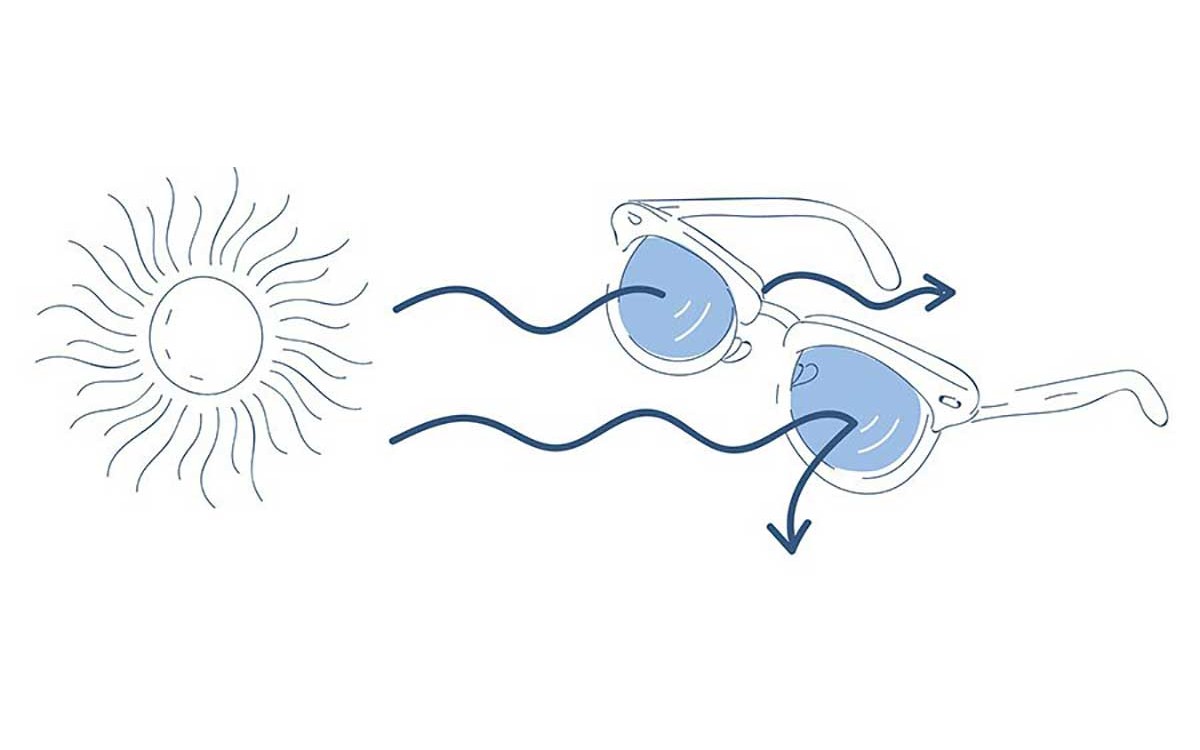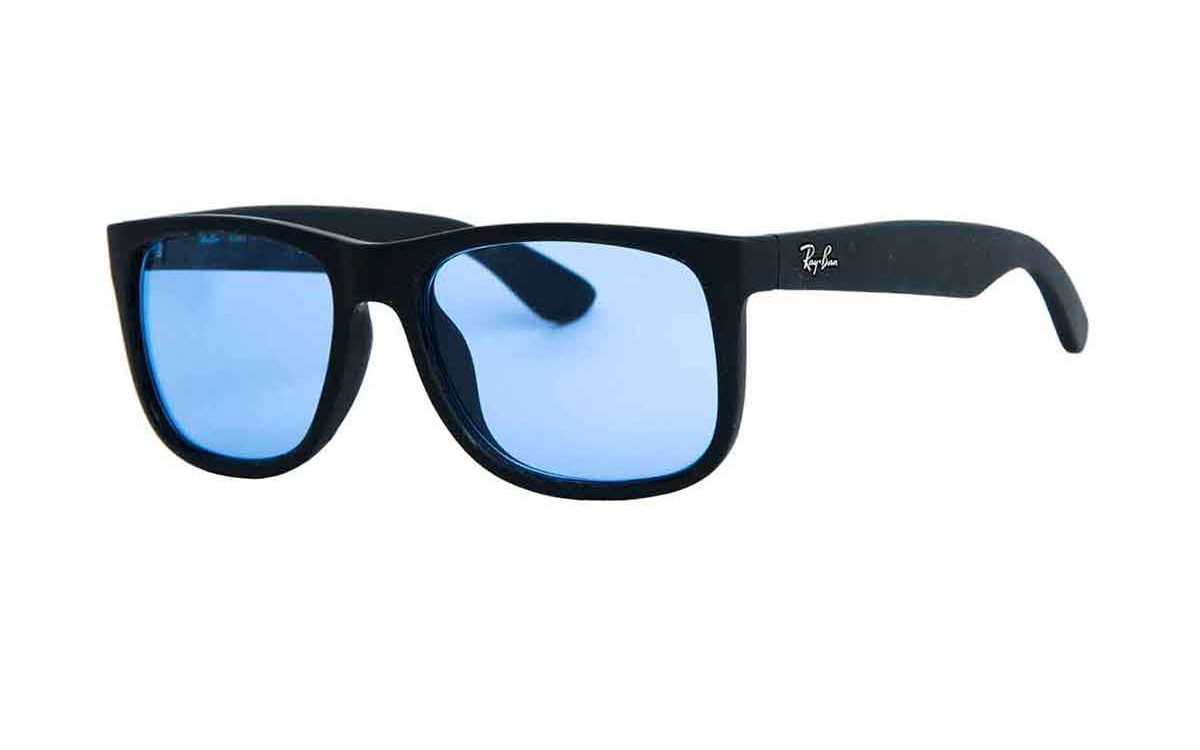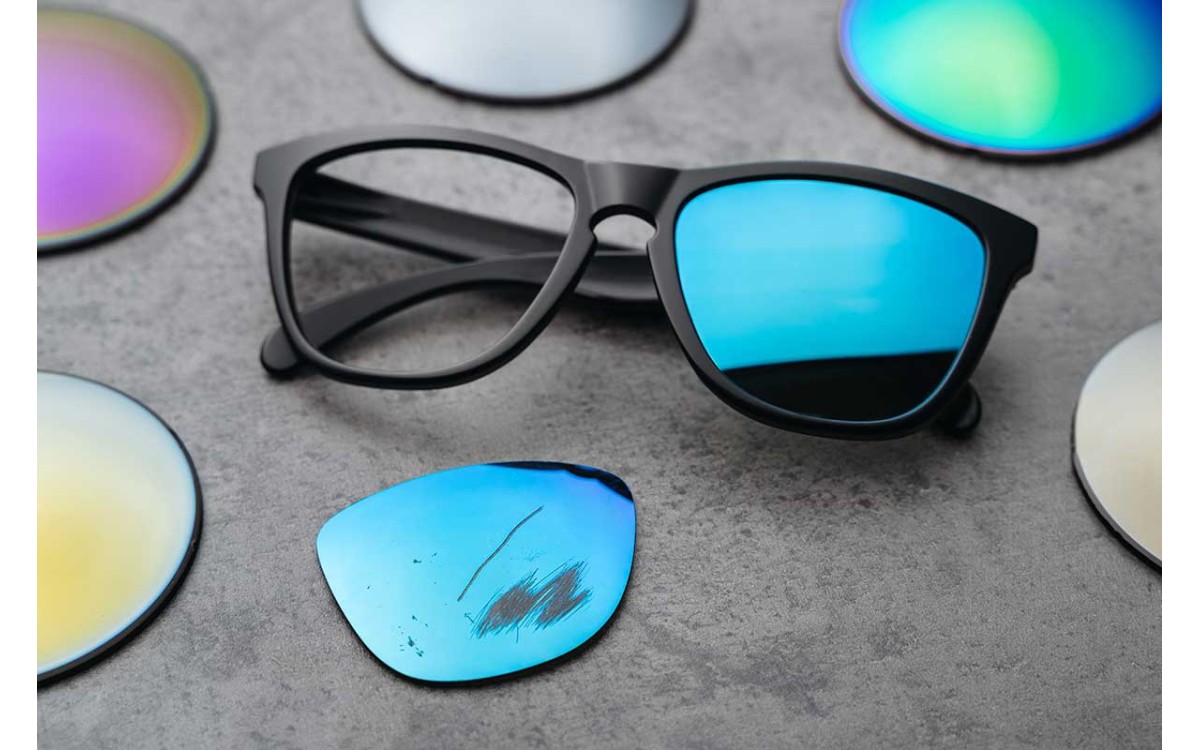What does “polarized” even mean? And, what are the benefits of polarized vs. non polarized sunglasses? Do non-polarized lenses really protect your eyes? These are the types of questions we all ask ourselves before splashing out on a new pair of sunnies or when we’re choosing replacement lenses for our favourite sunglasses. Read on to find out all you need to know. We’ll start with the all-important basics…
What is a polarized lens?
A polarized lens is one which is designed to reduce glare from reflective or bright surfaces. We apply a polarisation film to the outside of our lenses, which is created using a very delicate chemical process, to help filter out light. The chemical molecules in the film line up to proactively block out some of the light that passes into, and through, the lens, kind of like a blind might do with a window. Close the slats a little, and only some light can come streaming through – this is essentially how polarized lenses work.
For sunglasses, this means that they filter out ambient light as well as counteract glare. Technically, what’s also occurring is that the filter creates vertical openings for light – only light rays that beam in towards your eyes vertically can get through those openings. Polarized lenses therefore block out all horizontal light waves, including the glare created by light bouncing off flat surfaces like a window, car hood or patch of ice", as examples. So, you’re less likely to experience this “glare”, and it is safer for you when, for example, driving, as well as less irritating and stressful on the eyes themselves.
What’s the difference between polarized and non-polarized sunglasses?
In order to make clear the difference between polarized and non-polarized lenses, we need to take a look at the non-polarized option. Non-polarized lenses, put simply, only offer protection from light; they do not contain a filter allowing them to cancel out surface glare. So, yes, they can protect your eyes from the sun and from associated sun damage – this is called UV protection, which is different from polarisation in any case – but they will still allow glare or ambient light through, unlike polarized lenses, which as mentioned above, are designed to reduce glare.
You might think that not being polarized is less advantageous, somehow, but in actual fact both modes have their benefits. So, before you buy any replacement lenses, let us fill you in on what the benefits are for polarized sunglasses vs regular so that you can make an informed choice. Let’s take a closer look…

Benefits of polarized lenses
As you might imagine, the benefits of polarization are many. They reduce eye strain, increase clarity of vision and remove glare, which means eyes are far more comfortable. When you repair scratched sunglasses, a polarized lens offers all of these advantages over its non-polarized counterpart. Although polarization, as a process, makes a pair of lenses a little more expensive to buy, it’s also true that you get what you pay for and sometimes it’s definitely worth spending a couple bucks more, especially when there are so many tangible benefits. Money isn't everything, particularly when it comes to the health of your corneas, the quality of your vision, and also the stress you put your sensitive eye muscles under.
Reduced glare can also make activities such as driving safer, in many instances, because it means you’re not going to be suddenly blinded by reflected light from, say, a windshield or bumper. However, there are times when it might be more beneficial to take the non-polarized option – or take your polarized sunnies off.
Benefits of non-polarized lenses
There are some benefits to non-polarized sunglasses that are worth weighing up before you make a choice on your new lens option. For one, common non-polarized lenses can sometimes be a little more hard-wearing than treated lenses, although it's up to you as to whether that would outweigh the benefits given in the previous section.
It's also been found that non-polarized sunglasses may make white tones more true to their intended color, if that’s an issue for you. As a linked benefit, it can be easier to view LCD (liquid crystal display) screens with this type of lens. If you're using an LCD screen, well, maybe you shouldn't be wearing sunglasses anyway, would be our argument! But, anything LCD, like your car’s dashboard controls, your cell phone display, your LCD watch, as well as the info displayed on an ATM cash machine, will be affected if your lenses are polarized. Pilots, for example, don’t wear polarized sunglasses because it can make their instruments appear blacked-out. Meaning that non-polarized are the most beneficial in these cases.
There are also some situations in which more glare or light might be an advantage, too, making non-polarized lenses the better option. When driving, if conditions are icy, then non-polarized shades are better for seeing patches of ice on the road (this holds true if you’re skiing, too) – as polarized lenses would reduce glare, making the ice harder to spot.
Do non-polarized lenses protect your eyes?
This is a question we need to pick apart a little in order to give an answer. In truth, both polarized and non-polarized lenses will protect your eyes, if – and it’s a big if – they are made for UV protection. It’s whether they safeguard your eyes from ultraviolet rays that is the key query here, rather than ‘polarized vs non polarized sunglasses’. Polarized lenses and non-polarized lenses, protect your eyes from UV if they are labelled “UV blocking”. If they are not labelled as such, then, whether they’re polarized or not, makes no difference. They will not protect your eyes from UV rays.
All Sunglass Fix lenses offer 100% UV protection...even the un-tinted, clear, non-polarised lenses.

Can you repair scratched sunglasses with polarized lenses?
Yes! You can repair scratched or damaged sunglasses with either lens type. We hold replacement sunglass lenses for all top brands, too. Simply decide which lens would be most useful and advantageous to you, and select the style that suits. It’s as easy as 1-2-3, all you have to do is think about where you’re going to wear your reinvigorated sunnies and what you’ll be doing when you wear them. Think about this before you buy, then get our lenses delivered straight to your door. Polarized are, with us, cheaper than you’d imagine, and we can fit them perfectly to your favorite frames, no problem at all.
So, which type of lens is better?
Polarized sunglasses vs regular is a difficult question. Both polarized and non-polarized sunglasses have their place in our sunshine world! It really depends upon your own needs, what the shades will be shading you from, and so forth. As an example, if you're thinking of wearing sunglasses when playing water sports, then polarized lenses,to counteract glare coming from refracted light hitting off the water, would be the best choice. If you're going skiing and need the terrain to remain clear, as well as to spot icy patches, then maybe non-polarized glasses would be best.
Whatever you choose, make sure you go as far as you can with your budget and make sure to choose the best quality lens that you can. Sunglass Fix™ lens options offer both, and are of the highest possible quality, made by people (us here!) who truly care about all things lens-related. The wearer should wear the sunglasses, and not vice versa, so choose wisely, and choose what's best for you – now that you know the difference!








